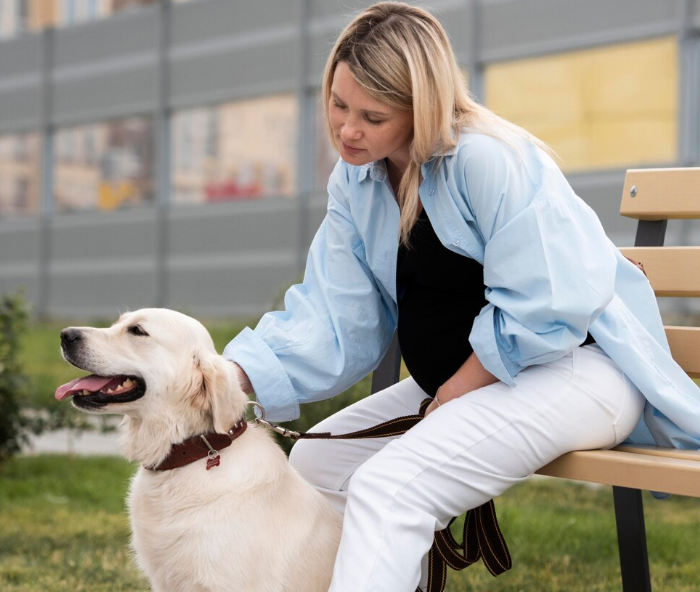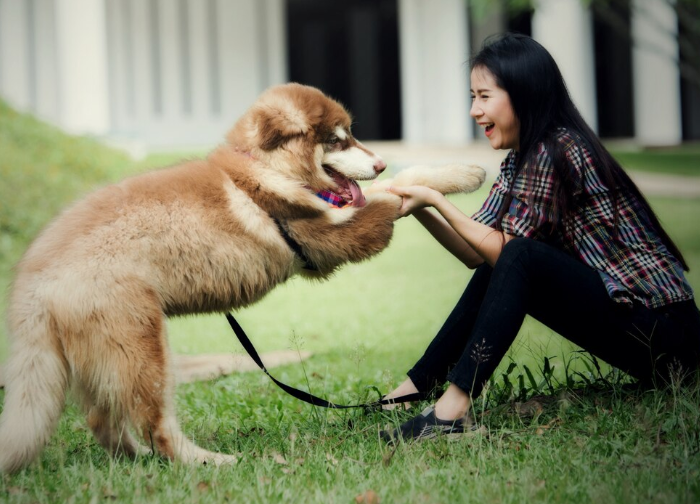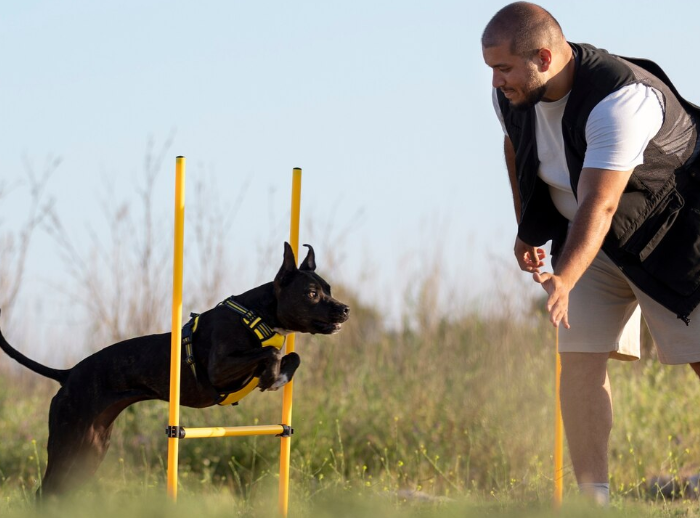- What Are Psychiatric Service Dogs?
- The Role of Psychiatric Service Dog Organizations
- Types of Psychiatric Service Dog Organizations
- Owner/Self-Training a Psychiatric Service Dog
- Things to Consider When Looking for a Reputable Psychiatric Service Dog Organization
- Reputable Psychiatric Service Dog Organizations in the UK and the EU
- Key Challenges for Psychiatric Service Dog Organizations
In recent years, psychiatric service dogs (PSDs) have become a vital part of many people’s lives, especially those living with mental health conditions like anxiety, depression, PTSD, bipolar disorder, and other psychiatric disabilities.
These dogs are individually trained to perform specific tasks that help mitigate the symptoms of mental health issues. Their assistance greatly contributes to managing daily challenges, increasing the sense of independence and improving the overall well-being of their handler.
Strong partnerships between handlers and their psychiatric service dogs are fostered by training organizations that support the process.
Today, we’ll explore the key role psychiatric service dog organizations play in raising, training, and matching service dogs with eligible individuals.
What Are Psychiatric Service Dogs?
Psychiatric service dogs are dogs individually trained to perform specific tasks that mitigate the symptoms of psychiatric health conditions, including but not limited to Post Traumatic Stress Disorder (PTSD), bipolar disorder, panic attacks, anxiety, depression, etc.
Unlike emotional support animals, who provide comfort and companionship through their presence alone, PSDs perform specific tasks. These can include providing Deep Pressure Therapy (DPT), interrupting panic attacks, reminding the handler to take medication, waking the handler up from nightmares, creating physical space in crowded areas, or guiding an individual out of stressful environments and more.
The specific tasks a service dog, including a psychiatric service dog can be trained to do, vary from person to person and are adapted to the individual’s specific needs.

The Role of Psychiatric Service Dog Organizations
Psychiatric service dog organizations play several key roles.
Training Service Dogs for Psychiatric Needs
Training a psychiatric service dog requires specialized knowledge. Organizations develop tailored programs to teach dogs how to recognize signs of mental health episodes and respond appropriately. This often involves teaching dogs to detect subtle behavioral or physiological changes in their handlers, such as increased anxiety or signs of dissociation.
Training is intensive, and focuses not only on obedience but on task-specific behaviors that directly address psychiatric symptoms.
Additionally, excellent manners in public are a mandatory component of each service dog training process. It helps ensure service dogs can not only respond to obedience cues and perform specific tasks for their handlers at home but that they are reliable assistants in environments with a lot of distractions.
Moreover, trainers continuously update their methods to incorporate the latest research in dog behavior and mental health support, ensuring that the trained service dogs are effective and reliable partners.
Assessment and Matching
A crucial step of the process is matching the right dog with the right person.
Psychiatric service dog organizations carefully assess both the dog’s temperament, such as calmness, focus, and sociability, and the handler’s specific needs, lifestyle, and psychiatric condition.
This helps ensure compatibility and increases the chances of a successful, and lasting partnership.
Organizations may conduct multiple evaluations, including home visits or interviews, to fully understand the handler’s environment and challenges. Matching also takes into account practical factors, such as the handler’s daily routine, living situation, and travel needs to ensure the dog can effectively support them in all aspects of life.
This thoughtful process helps prevent mismatches that could cause stress or reduce the effectiveness of the service dog.
Handler Education and Support
Beyond training dogs, these organizations provide education for handlers. This includes teaching individuals how to work effectively with their PSDs, including reinforcing commands, and maintaining training progress at home and in public.
They also offer guidance to handlers on addressing common issues, such as dealing with public access challenges or handling stressful situations that might trigger their symptoms.
Additionally, organizations often help handlers understand their legal rights under laws such as the Americans with Disabilities Act (ADA) or the Equality Act 2010, including how to advocate for themselves if their service dog is denied access.
Many organizations provide ongoing support through follow-up sessions, support groups, or online resources to help sustain the partnership long-term and encourage continual growth for both the handler and their service dog.
Advocacy and Awareness
Psychiatric Service Dog Organizations often advocate for the rights of individuals with psychiatric health conditions, and work on increasing public awareness about psychiatric service dogs and their important role.
Organizations engage in educational campaigns aimed at businesses, public institutions, and the public to help reduce misunderstandings and debunk myths associated with both mental health conditions and service dogs.
Their work may also include lobbying for stronger legal protections and clearer guidelines to ensure PSDs are accepted in public spaces, workplaces, housing, and transportation.
By sharing real-life stories and helpful research, these organizations raise awareness and understanding, which, in turn, makes it easier for people with psychiatric health conditions to get the support they need without facing unfair treatment.

Types of Psychiatric Service Dog Organizations
Nonprofit Organizations
Some psychiatric service dog providers operate as nonprofits, and focus on making service dogs accessible to people who might not be able to afford private training.
These groups usually rely on donations, grants, and the help of volunteer trainers to keep their programs running.
Because of their mission-driven approach, nonprofits usually prioritize matching dogs with handlers based on need rather than ability to pay. They may also offer additional support like education, advocacy, and community resources to help handlers build a strong partnership with their dogs.
A disadvantage of obtaining a service dog through a nonprofit organization is the long waiting list. You may need to wait one or several years to be paired with a service dog.
For-Profit Organizations
There are also private trainers and companies that specialize in psychiatric service dog training, and that offer personalized training and matching services for a fee. These trainers often work closely with clients to develop customized programs tailored to specific mental health needs and lifestyles.
Many for-profit trainers also provide other dog services such as therapy dog certification, general obedience classes, or behavior consultations, making them suitable for various dog training needs.
Because of the personalized attention and expertise, some handlers prefer this route despite the higher cost.
However, obtaining a service dog through a for-profit organization can be prohibitively expensive for many individuals, especially those living on a fixed income and receiving government support. The costs may reach up to €20,000-€30,000 / £17,000-£26,000.
Hybrid Models
Some organizations mix nonprofit and for-profit approaches to combine the best of both methods. They might offer scholarships or flexible pricing to make training more affordable, while still charging for certain services to help cover costs and stay sustainable.
These hybrid groups often partner with healthcare providers, therapists, or community agencies to ensure that their training fits into a broader treatment plan for the handler. This flexible approach can help more people access quality service dog training while maintaining high standards.

Owner/Self-Training a Psychiatric Service Dog
If you already have a furry friend at home, why not train them as a PSD?
Based on your location, this option may be legally permitted! For example, UK citizens are protected by the Equality Act 2010, which specifically states, that assistance dogs may be owner-trained.
According to the Government of the Netherlands: “Assistance dogs are specially trained to help people with disabilities in their day-to-day lives. Your dog helps you live the way you want to, just like everyone else. You can take your assistance dog into shops and many other indoor spaces”.
Even if owner/self-training a service dog in your country or region is not explicitly covered by local laws, there is usually an option to have the dog evaluated by an accredited local trainer and officially recognized.
Training your own dog as a psychiatric service dog offers a major advantage over obtaining an already trained one: the strong emotional bond you’ve already built with your furry friend.
Remember, if you get an already trained dog, you’ll still need time to get to know the dog as an individual and learn how to be a reliable handler. When you train your own dog, the foundation is already there, and you just need to use the right approach to teach your furry friend the specific tasks you want them to perform.
However, you should be prepared to invest time and energy and put effort into the process. Patience, consistency, and commitment will be required for the training to succeed.

Things to Consider When Looking for a Reputable Psychiatric Service Dog Organization
When looking for an already trained psychiatric service dog, it’s important to choose an organization that:
- Follows ethical training practices, and prioritizes the welfare of the dog and the handler.
- Provides clear information about training methods, timelines, and costs (if for-profit).
- Offers individualized assessment and matching.
- Supports handler education and ongoing follow-up.
- Respects legal standards for service animals and helps handlers understand their rights.

Reputable Psychiatric Service Dog Organizations in the UK and the EU
While awareness of psychiatric service dogs is growing across Europe, the legal and institutional frameworks are still developing, especially compared to countries like the US, where service dog teams enjoy strong protections under several federal laws.
Nonetheless, several organizations are actively supporting individuals with mental health disabilities.
Service Dogs UK (for those with PTSD who have served)
Service Dogs UK is a charity accredited by Assistance Dogs UK (ADUK), specializing in training PTSD support dogs for veterans and emergency service personnel.
“We provide Veterans from the Armed Forces and Emergency Services suffering with PTSD the benefit of specially trained assistance dogs.”
Bravehound (Scotland)
This is a registered Scottish charity providing trained dogs to support veterans with PTSD and related mental-health issues.
“We provide assistance dogs and training, however we are currently only able to accept applications from veterans living in central Scotland”.
Psychiatric Assistance Dogs Foundation – PADs (England)
This is a charity offering training guidance and placement services for psychiatric assistance dogs across psychological conditions, with medical referrals and public-access support.
“We are committed to improving the quality of life and independence of people with psychiatric disabilities, by having a psychiatric assistance dog”.
Pawsable (England)
A not-for-profit organization in England, with experience in training dogs to assist their owners in public, helping to mitigate the symptoms of diagnosed disabilities.
While the organization specializes in autism assistance dog training, they also support individuals with a wide range of disabilities, helping them train their dogs to become life-changing paw companions.
Dogs for Good - My Cause UK
This is a charity, exploring ways on how dogs can help people manage specific challenges and enrich and improve lives and communities. They offer several types of services, including assistance dogs services supporting adults and children with physical disabilities and autism; workshops and ongoing support to families with a child with autism, and community dog service, helping adults and children to work on a range of personal challenges and develop life skills.
VITA Assistenzhunde (Germany)
Based in Germany, VITA trains and provides service dogs for people with physical and sometimes psychiatric disabilities. The non-profit organization is known for its high training standards and ethical practices.
Dog4Life (Italy)
This Italian organization provides assistance dogs for various disabilities, including psychiatric and PTSD-related support. They also work on raising awareness and educating the public about service dog rights.
This non-profit organization is the only ADI member in Italy.

Key Challenges for Psychiatric Service Dog Organizations
Psychiatric service dog organizations play a vital role, but their work comes with unique and ongoing challenges, such as:
Funding and Resources
Training a psychiatric service dog is an intensive, long-term process that can take 1–2 years and cost tens of thousands of dollars. These costs include veterinary care, food, housing, specialized training, and staff salaries.
Many organizations rely heavily on donations, grants, or limited government support, which can make it difficult to meet the growing demand.
As a result, waiting lists are long, and access may be limited for individuals who can’t afford private training.
Public Misunderstanding
Unlike guide dogs who support individuals with visual impairments, psychiatric service dogs assist people with “hidden” conditions, which are often misunderstood.
The public may not recognize mental health disabilities as valid or might assume the dog is merely an emotional support animal. Educating the public is a constant challenge for organizations that try to advocate for equal rights and inclusion.
Legal Recognition
Legal recognition of psychiatric service dogs varies widely by country, and even within countries, different sectors (housing, air travel, public access) may follow different rules.
In the US, the Americans with Disabilities Act (ADA) provides federal protection, but in Europe there is a lack of unified legal framework and each country has its own regulations. Laws are often less defined, especially for self-trained dogs or those not provided by accredited organizations.
This creates confusion for both handlers and businesses, and organizations must frequently step in to educate, advocate, and support legitimate service dog teams through bureaucratic hurdles.
Psychiatric service dog organizations play an essential role in supporting mental health. By training highly skilled dogs, guiding their handlers, and raising awareness, these organizations help connect people with the life-changing support a service dog can provide.
As understanding of psychiatric disabilities continues to grow, these organizations are opening doors for more individuals to find comfort, and independence, and regain their confidence through partnerships with reliable paw companions!












